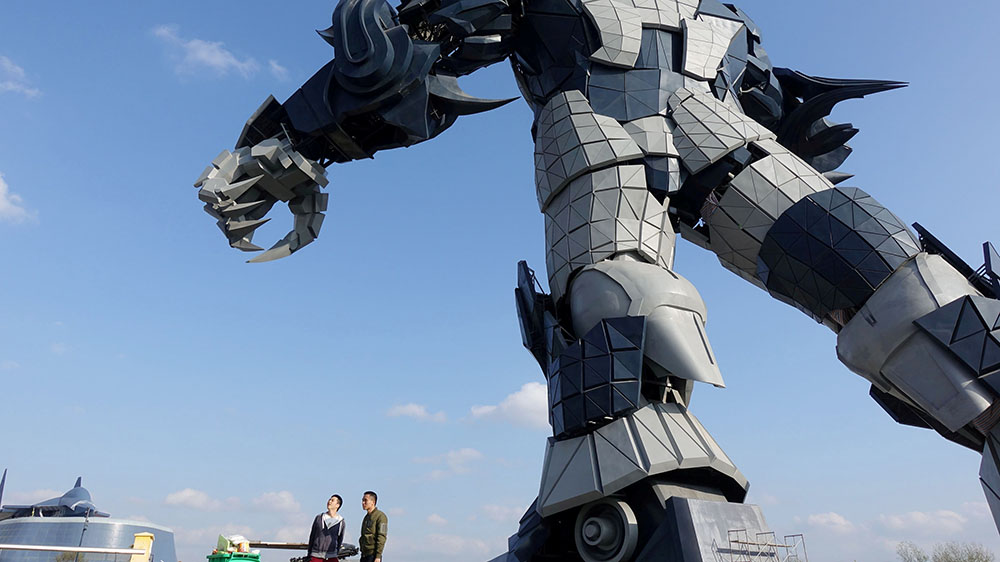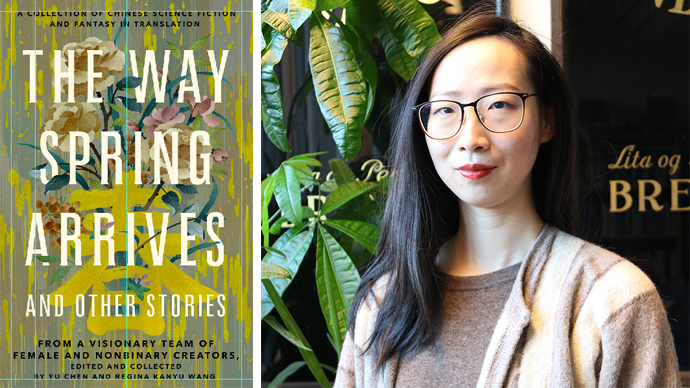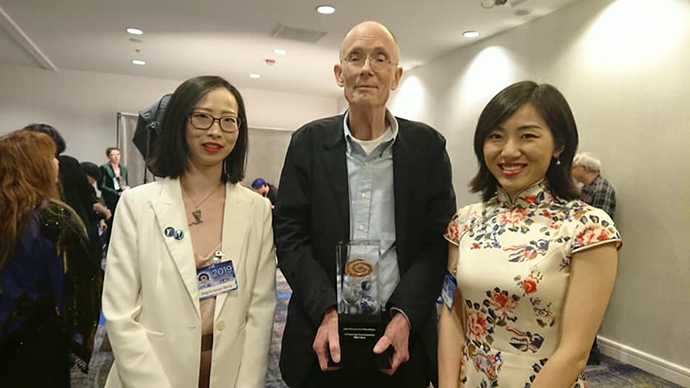Science fiction is popular at the same time as a new wave of feminism hits China. This leads to more attention for female authors of the genre.

The popularity of chinese science fiction has turned it into an industry in China. 'The Oriental Science Fiction Valley' opened in 2018 and was the first science fiction theme park in China. Photo:Joseph Campbell/Reuters/NTB.
"Originally science fiction was a hobby for a minority group. Today there are more companies willing to invest in science fiction, and the government is establishing science fiction industrial parks for tourism purposes in China", tells Regina Wang.
Wang is a Doctoral Research Fellow at the Department of Culture Studies and Oriental Languages and is doing research on the science fiction genre.
Lately, Chinese science fiction is getting a lot of attention in China, but also internationally.
Fan, writer and researcher
Wang works in the research project 'CoFutures: Pathways to Possible Presents' where they look at global science fiction and the non-anglophone tradition, researching science fiction from Latin- American, Africa, India, Arabic-countries and more.
Wang is researching the genre in Chinese. Her interest in science fiction started a long time before it got popular in China. She started out as a fan, then began writing stories herself.
As a researcher, she looks at science fiction texts, movies, tv-series and arts.
She gives the book The Three-Body Problem written by Liu Cixin, and Hao Jingfang's novelette Folding Bejing much of the credit for popularizing Chinese science fiction. Both stories have won The Hugo Award, in 2015 and 2016 respectively.
This international award is given annually by the World Science Fiction Society for best science fiction work.
Market interests creates more topics to explore
The most popular science fiction author in China, Liu Cixin, writes in the same style as the classic writers within the genre, such as Isaac Asimov, Arthur C. Clarke og Robert A. Heinlein.
"Liu's huge success brings attention and market interests to science fiction in China, and thus open doors to other styles", Wang explains.
The popularity makes it easier for stories that differ from the classics within the genre to get published.
"A larger market and more platforms on which to publish stories now give science fiction writers the opportunity to explore a larger variety of topics", Wang says.
In the past few years, she has seen that science fiction authors are also writing about indigenous people and people of different ethnicities.
"They incorporate more forms of cultural heritage, using mythology stories, folktales and mindsets, in imagining about the future", Wang tells.
The popularity of science fiction makes it possible for more people to write, and it also attracts those interested in feminism.

Feminism in science fiction?
While science fiction has gained in popularity, the MeToo Movement has contributed to a greater awareness about feminism in Wangs home country.
"When the popularity of science fiction and feminism coincide, like in recent years, it becomes a phenomenon that more people are interested in and talking about", she says.
The last time feminism was a topic of discussion in China was in the mid 1990's, when the UN's Fourth World Conference on Women was held in Beijing.
"At that time the commercialization of feminism in China stopped women writers from talking about it. You didn't want to be a beautiful female writer, but a good writer", Wang explains.
Today, more women are joining the discussion, and because of the Internet, more people are aware of ongoing debates, she thinks.
In the discussions female science fiction authors receive more attention. Wang has looked more closely at the topics in the genre.
"Some of the stories reflect the author's concerns about reproduction and the female body", she says.
Examples can be found in online novels about reproduction in the future.
"There are all kinds of imaginative stories about women that are required to bear children, like in The Handsmaid's Tale. But you also have stories about matriarchy systems", she explains.
"They don't write about radical feminism or about an oppressive patriarchy, but try to weave in feminist themes in more subtle ways", Wang observes.
"One way to explore how feminism is expressed in their stories is to look at how they input the way of 'Yin', which represents feminine and softer values, in contrast to the masculine 'Yang'", she says.
Moreover, it is clear that female writers in China think about the fact that the protagonist is most often a man.
"In the past we didn't challenge this idea. The dominant tradition being masculine, it is natural to read science fiction stories with a male as the protagonist. Nowadays, there are more women writers who reflect on these things. They write female astronauts or scientists into their stories about the future. That way, we get more feminist thinking and input in science fiction", Wang explain.
Wang believes that they still have a long way to go inside the genre and compares China with Korea.
"Korean writers are using the feminist movement more actively in science fiction in order to explore feminist ideas".
Explores the unknown in various ways
Feminism is not the only topic influencing Chinese science fiction. In the stories, you also find subjects such as environmental issues and the pandemic.
In 2020, Wang wrote the story 'A Cyber-Cuscuta Manifesto' for 'The Center of Science and the Imagination' at Arizona State University, about parasitic beings in the digital world that feed on people's data. Despite the fact that they sustain themselves by imitating data, they do no harm, but on the contrary tidy up our digital world.
"The story proposes that we should coexist with things we do not know that much about yet. Not only in the physical world, but also in the digital one", she says.
One of Wangs favourite science fiction stories is 'The Martian Architect', written by Xia Jia, one of China's most famous female science fiction authors. There is a story inside the story about a group of people who live on Mars and are faced with a difficult choice when a spaceship arrives. Everyone aboard have died from a virus, except for a small child.
"So they need to decide: Should they let the child on to the planet and risk being infected themselves, or should they reject it and let the child die alone in space", she says.
Instead of choosing one of those two alternatives, the protagonist finds a third option. She decides to go live on the spaceship with the child and create a new society along with others who gradually join them.
It is precisely this third possibility that makes the science fiction genre so fascinating, Wang believes.
"Science fiction is about pushing boundaries and suggesting new solutions. I think that is a key feature of the genre" she says.
Science fiction can also contribute with a global perspective on the climate challenges we are facing.
"From an individual perspective global changes are happening at a distance and on a scale that is difficult to relate to our daily life. But in science fiction, you can change your perspective and look at our whole species, planet and universe. So it can provide you with a different way of thinking, and hopefully, it can help people think new thoughts about the challenges we are facing".

A chosen metaverse and the near future
The most popular topics in Chinese science fiction is still artifical intelligence and the metaverse. But the stories have changed.
"In the past, the stories were about people escaping into a virtual world in order to avoid an uninhabitable planet. But in recent years, stories are about people who seek out the virtual world voluntarily, embracing all the alternatives, stimulation and entertainment there because they want to", tells Wang.
She also observes that people are more interested in reading about the near future, from fifty to a hundred years forward in time.
"They take advantage of certain tendencies in technology and in the society and try to relate these tendencies to what might happen in the near future. Because it might happen soon, it makes people feel more connected to the story".






